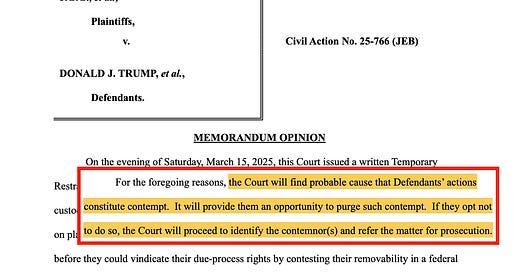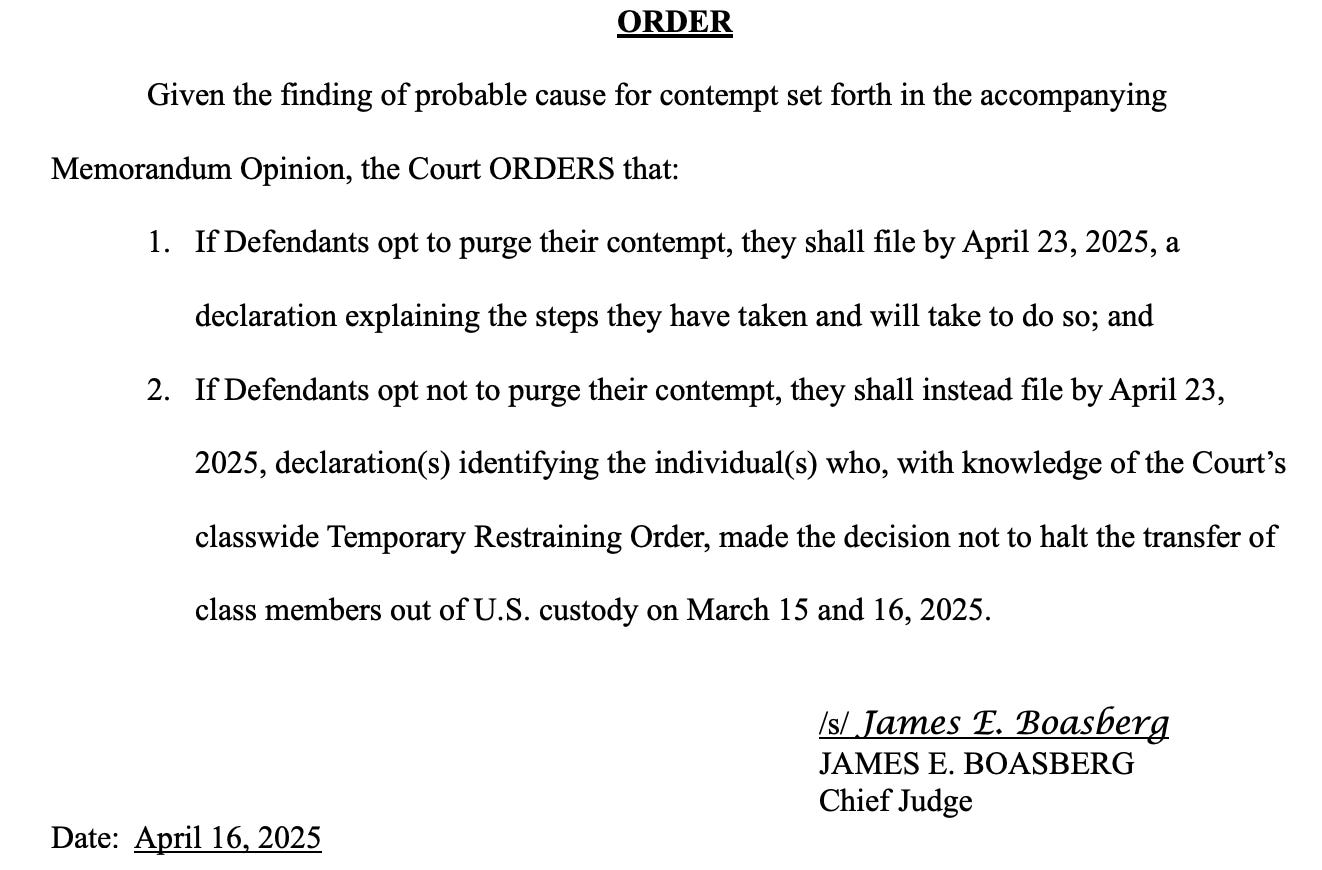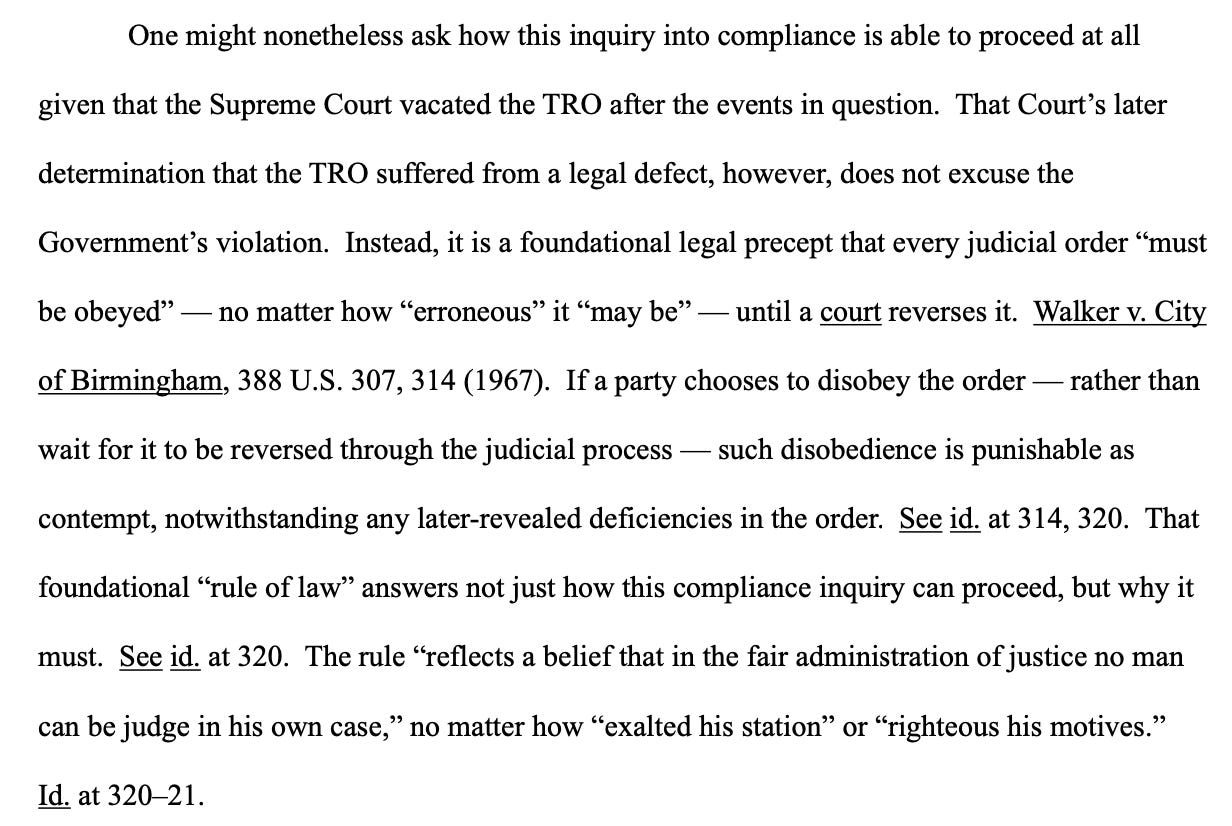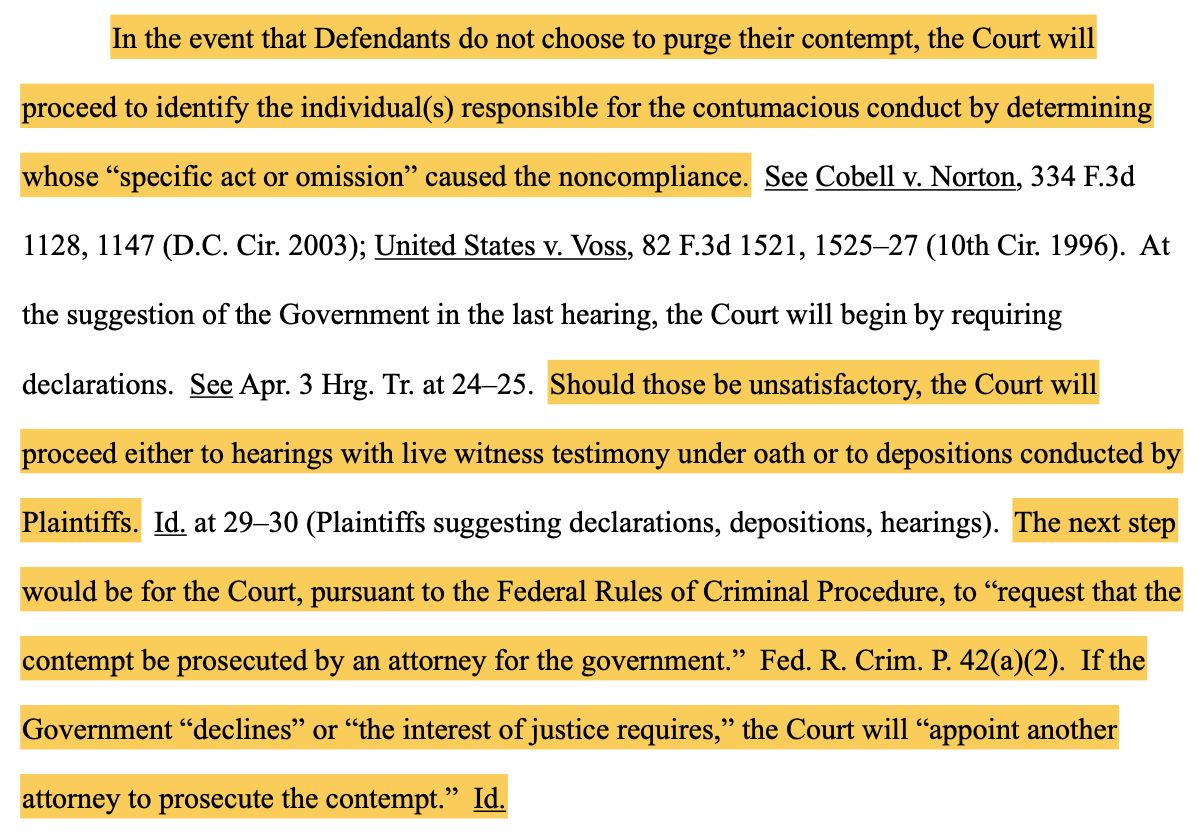Judge finds "probable cause" the Trump admin is in contempt over March 15 flights
In Chief Judge Boasberg's opinion in the Alien Enemies Act case, his next steps include possible prosecution of Trump officials by a court-appointed attorney.
Chief Judge James Boasberg has found “probable cause” that the Trump administration should be held in contempt because it “willfully disobeyed” his Saturday, March 15 orders that the administration not deport people under President Donald Trump’s Alien Enemies Act proclamation while a case challenging the proclamation could proceed.
“From the opening hours of Saturday, the Government’s conduct betrayed a desire to outrun the equitable reach of the Judiciary,“ Boasberg wrote in his 46-page opinion. With Wednesday’s ruling, however, Boasberg asserted that the judicial branch must assert its place to hold the executive branch accountable when that “outrunning” crosses the line into “disobeying” a judicial order.
Finding probable cause that happened here, Boasberg concluded that the administration now has a choice. It can “purge” the contempt — essentially, fix its failure to follow the court order by following it now — by “asserting custody” of the class members who it deported in violation of the order and providing them with access to habeas proceedings to challenge their designation as being covered by Trump’s AEA proclamation. If the Trump administration does not do so, however, Boasberg set forth “next steps” that would include identifying who in the administration should be held in contempt; requesting prosecution by the government; and, if needed, appointing an attorney to do so.
The administration has until April 23 to decide which path it wants to take, under a deadline set by Boasberg in an accompanying order.
The ruling from the chief judge of the federal district court in D.C. is the most direct decision from a federal court over the past 86 days asserting that the Trump administration has likely violated a court’s order. It also sets in motion a process that is likely to challenge whether the courts actually retain the ability to constrain the Trump administration — a fundamental question about whether our Constitution’s separation of powers remain functioning.
It is, ultimately, a question about whether the Constitution as we know it remains in effect.
Boasberg appeared plainly aware of the stakes of his opinion for the nation, expressed at points as the reason why Wednesday’s opinion was necessary.
“The Constitution does not tolerate willful disobedience of judicial orders — especially by officials of a coordinate branch who have sworn an oath to uphold it,” Boasberg wrote.
Just to be clear, and as Boasberg noted, the Supreme Court’s subsequent ruling vacating the orders at issue here because, the majority held, Alien Enemies Act challenges must be brought in habeas — not through the Administrative Procedure Act under which Boasberg had issued his orders — does not change how this matter is to proceed.
“If a party chooses to disobey the order — rather than wait for it to be reversed through the judicial process — such disobedience is punishable as contempt, notwithstanding any later-revealed deficiencies in the order,” Boasberg explained, citing and quoting from a central Supreme Court ruling on the question. “That foundational ‘rule of law’ answers not just how this compliance inquiry can proceed, but why it must.“
On Wednesday, Boasberg did just that.
[UPDATE, 7:30 p.m.: The Justice Department filed a notice with the court that it is appealing Boasberg’s opinion and order to the U.S. Court of Appeals for the D.C. Circuit. (Read more here.)]
How we got here
In the early morning hours of March 15, lawyers with the ACLU and Democracy Forward filed a lawsuit in federal court in D.C., with the belief that Trump was poised to invoke the Alien Enemies Act of 1798 — only previously invoked during wartime — to deport their clients and others from the United States.
Believing such an action would be illegal and unconstitutional, they sued and Boasberg granted them a temporary restraining order that morning to block the removal of the five individual plaintiffs. However, the case filed was seeking to have those five individuals represent a class, which requires court approval, so Boasberg also set a hearing for 5 p.m. that day to address the class request.
Shortly before the hearing, the administration posted the proclamation, which targeted people the administration determined were members of the Venezuelan gang Tren de Aragua for removal under the AEA.
It was at and after the 5 p.m. hearing where Boasberg issued the orders at issue. After granting provisional class certification, Boasberg announced he was issuing a classwide TRO — to temporarily bar removal of all people the Trump administration was asserting were covered by the proclamation targeting people the administration determined were members of the Venezuelan gang Tren de Aragua — and that DOJ’s clients be “immediately” informed of the order.
That included Boasberg’s comments that, if there were class members on a plane “that is going to take off or is in the air, . . . those people need to be returned to the United States. However that’s accomplished, whether turning around a plane or not [dis]embarking anyone on the plane . . . , I leave to you. But this is something that you need to make sure is complied with immediately.“ A follow-up written order was issued noting the provisional class certification and the prohibition on removing class members.
That is not what happened.
As Boasberg put it on Wednesday, “Despite the Court’s written Order and the oral command spelling out what was required for compliance, the Government did not stop the ongoing removal process.“
The month since has been a whirlwind, but, as Boasberg laid it out, it amounted to “increasing obstructionism on the part of the Government as it refused to answer basic questions about what had happened, questions that were all ultimately in service of resolving one key fact: whether members of the Plaintiff class — that is, noncitizens removable solely on the basis of the Proclamation — were transferred out of U.S. custody after this Court’s injunction preventing their deportation.”
And, though the Supreme Court ultimately held that the APA — and, hence, D.C. — was not the appropriate way — and, hence, venue — to challenge these actions, Boasberg also noted, “all Justices agreed that the Due Process Clause requires” notice and the ability “to actually seek habeas relief” before being deported under the AEA.
In short, Boasberg wrote:
[T]he Court effectively said that the Constitution flatly prohibits the Government from doing exactly what it did that Saturday, when it secretly loaded people onto planes, kept many of them in the dark about their destination, and raced to spirit them away before they could invoke their due-process rights.
Which brings us back to Wednesday’s ruling.
The contempt probable cause finding
Boaseberg explained the history of his authority to issue Wednesday’s order, including the current applicable law about criminal contempt, which requires, as Boasberg detailed, a ruling that is has been “shown beyond a reasonable doubt: (1) that the court order was “clear and reasonably specific”; (2) “that the defendant violated the order”; and (3) “that the violation was willful.”
Although Boasberg meticulously details important questions of jurisdiction and venue, his bottom-line explanation of why he is proceeding here in wake of the Supreme Court’s order is summed up as such: “The question presented here is whether there is probable cause that Defendants deliberately or recklessly disregarded a clear and reasonably specific order. … The question is not — as many of Defendants’ evasive legal arguments imply — whether that Order was legally impeccable.”
As to the specificity requirement, Boasberg goes through the government’s arguments that “removal” only meant departure from the United States, concluding, “numerous exchanges throughout the hearing, including the ultimate unequivocal oral command that clarified how the TRO must be obeyed, demonstrate that the Court consistently considered removal to be not mere physical removal, but instead legal deportation that was complete upon transfer out of U.S. custody.“
The administration, Boasberg continued, is essentially not even challenging the violation requirement. “Rather than mount any factual defense, they rely on post-hoc legal arguments to attack the validity of the Order itself,“ he wrote. “[W]hat matters is whether they violated the terms of the Order, not whether the Order itself was legally valid.”
In one abrupt section, Boasberg explains:
If Defendants believed — correctly or not — that the Order encroached upon the President’s Article II powers, they had two options: they could seek judicial review of the injunction but not disobey it, or they could disobey it but forfeit any right to raise their legal argument as a defense against criminal-contempt charges. … They chose the latter course.
On the substance of the government’s claim that Boasberg — and all courts — lack authority over the executive’s actions once outside of U.S. airspace, Boasberg noted, “Defendants’ extravagant assertion of Article II power, moreover, runs headlong into the fact that courts regularly adjudicate — and sometimes, through their equitable powers, restrain — Executive Branch conduct abroad.”
As to the final requirement of whether the violation was willful, Boasberg noted the government’s “conduct” on March 15 “suggests an attempt to evade an injunction“ and that the government’s attempts in the weeks since to “muddy the waters” are belied by the reality of that day.
“Government counsel has since confirmed that he understood the oral command and communicated it up the chain,” Boasberg noted. “The Government plainly had an opportunity to avoid noncompliance — and yet it chose to press ahead.“
As such, Boasberg concluded “that there is probable cause that Defendants willfully disobeyed a binding judicial decree.“
“So now what?”
In another sign that Boasberg understood what this moment would mean for the country, he provided a clear roadmap for what happens now.
“[B]efore initiating any criminal-contempt proceedings, courts typically allow the contumacious party an opportunity to purge its contempt — that is, to remedy its violation by voluntarily obeying the court order.“
In short, the Trump administration could choose to follow the orders now. Although Boasberg provides that that could include “asserting custody” over the people removed in violation of the order so that they could bring habeas claims, he also noted, “The Court will also give Defendants an opportunity to propose other methods of coming into compliance, which the Court will evaluate.”
In the accompanying order, Boasberg gives the administration until April 23 to provide “a declaration explaining the steps they have taken and will take to do so."
If not, Boasberg noted, then he will “proceed to identify” the person or people “whose ‘specific act or omission’ caused the noncompliance.”
Specifically, the accompanying order noted, if not seeking to purge the contempt, the government is to file declarations by April 23 “identifying the individual(s) who, with knowledge of the Court’s classwide Temporary Restraining Order, made the decision not to halt the transfer of class members out of U.S. custody on March 15 and 16, 2025.“
The next step will start with those declarations, but could proceed to “hearings with live witness testimony or to depositions conducted by Plaintiffs,” Boasberg explained.
Once those responsible are identified, Boasberg stated, the court would ask for the government to prosecute the contempt. That would, of course, be referring to lawyers operating under Attorney General Pam Bondi’s Justice Department.
Citing the Federal Rules of Criminal Procedure, Boasberg then concluded, “If the Government ‘declines’ or ‘the interest of justice requires,’ the Court will ‘appoint another attorney to prosecute the contempt.’”











I just read the ruling. Boasberg set this up perfectly with perfect boundaries for a narcissist. But it looks to me like it’s heading straight to the Supreme Court …so here we go folks this is important.
And another contempt train is set to leave Xinis' courtroom in a couple of weeks (if McFadden doesn't beat her to it).